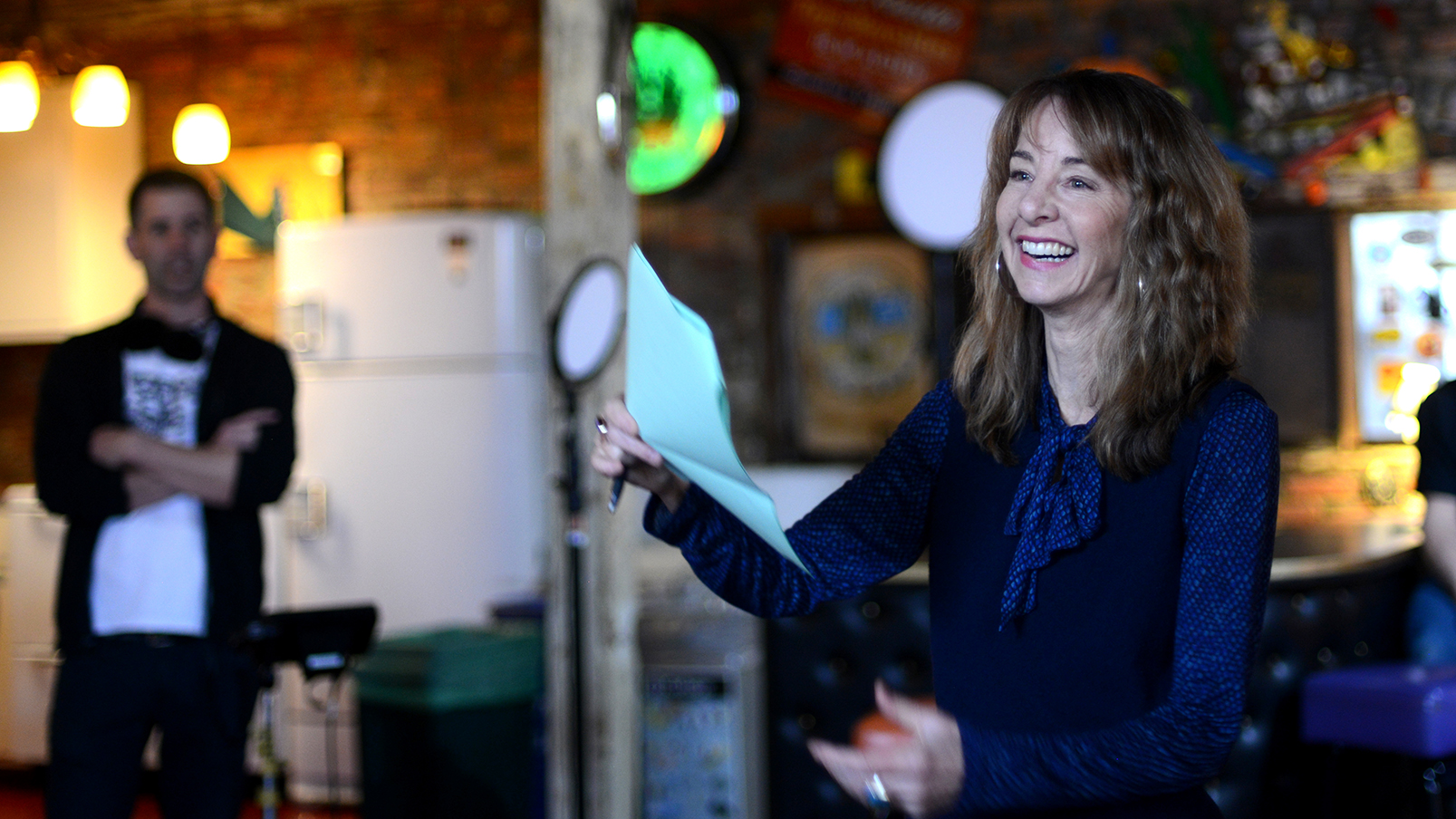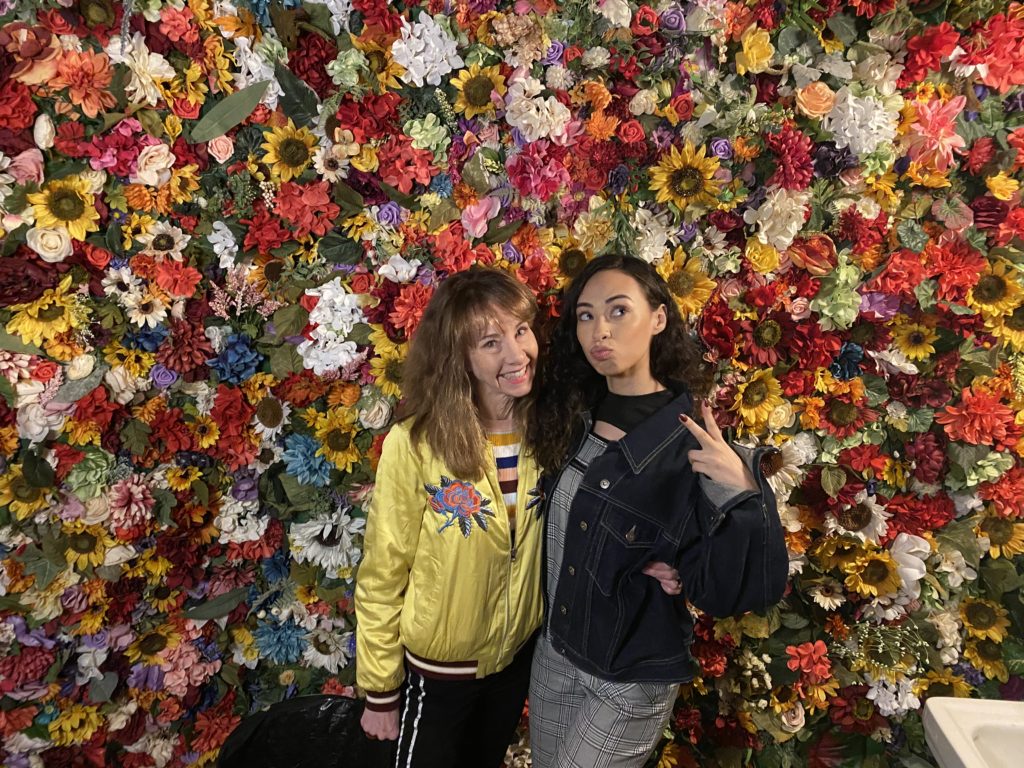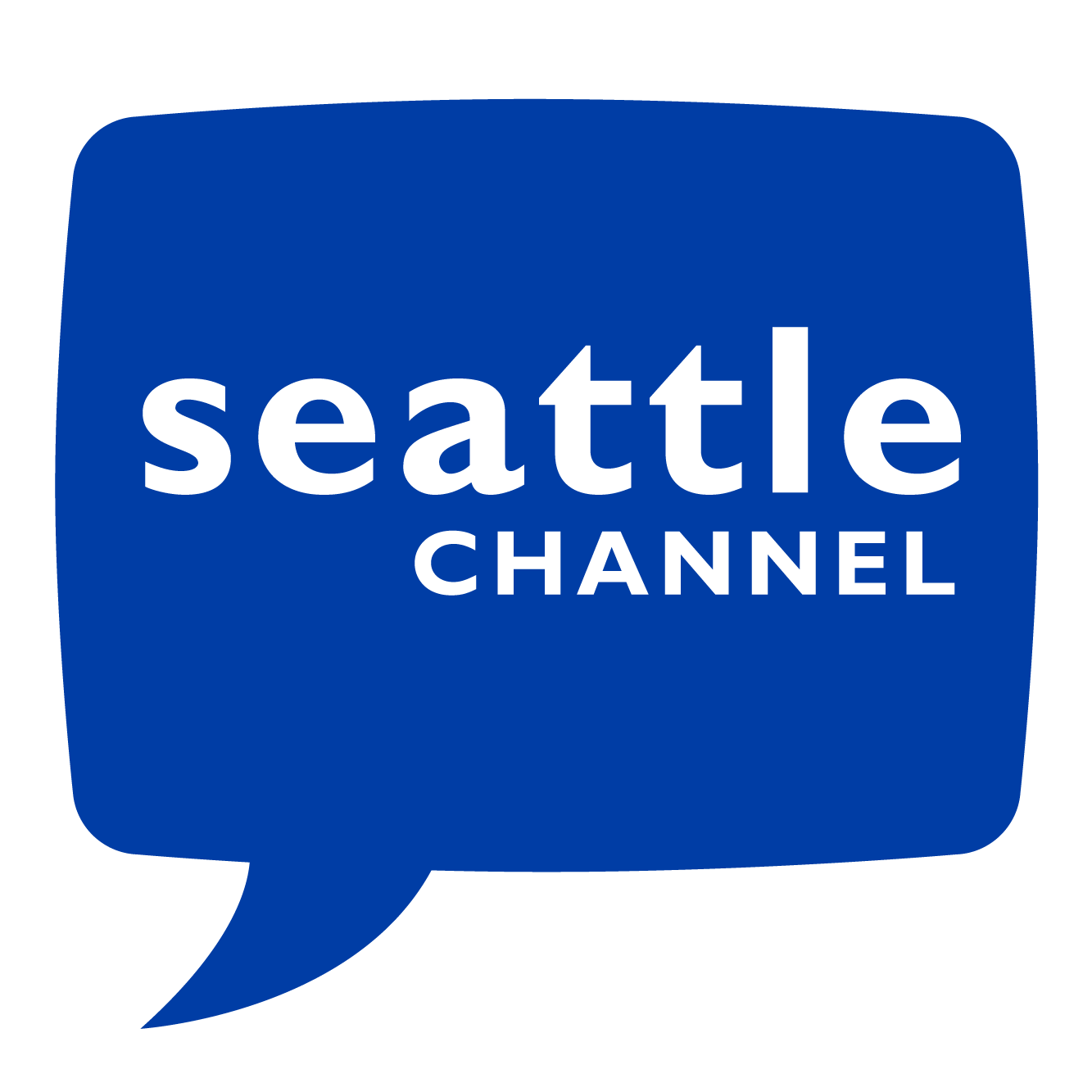
BY ERIN JONES / SEATTLE CHANNEL MULTIMEDIA INTERN
She’s an actress, comedian, and a local icon. For more than 30 years, Nancy Guppy has been a mainstay on Seattle televisions. She got her start on “Almost Live!,” a sketch comedy show that aired for 15 years on KING-TV. These days, Nancy has her finger on the pulse of the local art and music scene with her show Art Zone with Nancy Guppy, a Seattle Channel program that showcases the city’s rich culture scene.
These combined experiences, in addition to her many roles as a writer, producer and TV host, have made Nancy a formidable interviewer – she’s made it an art.
I recently phoned Nancy for an unfiltered video interview, where I flipped the script and put the star of the show in the guest chair.
This interview has been edited for length and clarity.

When did you first start interviewing people on television?
In the mid-90s, I was hired to do a show called “The Salmon Exchange.” It was on UWTV, and it was an environmental show about salmon. Now, they hired me because I had some personality on camera. They certainly didn’t hire me because I knew a lot about salmon or the environment. But in that show I did do interviews. I didn’t have a lot of interview training. It was really in the moment and whatever the job demanded.
You mentioned they liked your on-camera personality. You must have had some kind of persona you put on? But I know you, and I’ve seen you on set and how spontaneous and hilarious you are naturally, so I can see how that translates well on camera.
Yeah, I think it does. It would be false for me to not acknowledge what you’re saying. Of course I know that I have an energy; I know how I’m moving on a set; I know how I’m interacting with people even when it’s off camera. When I enter the door of Georgetown Stables, I walk in and I am immediately on. I’m on to be aware of everyone in the room, I always acknowledge everyone, and I try to make sure I say “hi” to everyone. I know I have to connect, I have to infuse this energy into the room because I have to have it in order to do what I need to do. I need the room to be activated. That’s a really important part. For me to connect with everyone, hopefully have everyone in a decent mood or feel seen, and have a positive attitude. Because that all comes back to me when I’m trying to do what I’m doing, which takes a whole lot of energy.
It’s funny you say that because my first impression of you happened when I was on set for Art Zone and you weren’t there yet. I was sitting down in a chair, and you came up to me and you said, “Hi, I’m Nancy!” and I was like, “Oh my gosh, she’s so nice.” You took time to say hi to me and everyone else. It really did bring up the energy on set that day. It was the Benecio Bryant shoot. The energy that day was through the roof and it was a great experience for me as my first day as an intern on Art Zone.
Let me speak to that. I believe that’s the crucial piece of life right there. For me to come up to you and say hi, of course I’m going to. It’s your first day, you don’t really know anyone and it’s extremely important that you understand that you’re welcome and I’m happy you’re there. I’m talking just human to human. It’s not like, “Nancy’s talking to the intern!” That’s the bullshit piece of it. It’s all about connecting as people. And when that happens, when people feel seen, they always rise to the occasion.
You interview artists, comedians, musicians, public figures, the list goes on. What does your preparation process look like before an interview?
It’s a lot of work. I have to organize my thoughts. For example, let’s just say I’m going to interview Benicio. First of all, I try to get information about him. I’m going to start digging around and find basic storylines about him and his background. And then, I start writing out what I want to know. “He’s from Maple Valley, and he’s got a dad who works for the Mariners, and he’s so-and-so age, and he did this thing with Brandi Carlile.” So, I just start throwing down bits and pieces of facts, and then I start to think about “What would that question be, what am I trying to ask here?”.
Do you memorize your questions?
I don’t memorize, but I’m highly familiar with the material.
Do you brief your guests with the questions you’re going to ask before you begin filming?
I’ve learned something this year, it’s good to brief people to a degree so that you’re accurate and you don’t have incorrect information. There were a few times when they would say, “No, that’s not right,” or “The title is incorrect,” and it has been so helpful.
Recently, with the COVID-19 pandemic, the Seattle Channel has had to suspend the production of Art Zone and it’s become “Art Zone Phones It In.” You didn’t necessarily have to go back on air, but you did. Have you learned anything new hosting a show virtually?
I’ve learned a lot. I didn’t want Art Zone just to go away. I’ve learned that it’s really fun to do stuff on the DIY (Do It Yourself). My husband Joe and I are shooting it on an iPhone, and Joe has learned how to do iMovie editing. We have had a lot of fun coming up with bits, and I haven’t done that for a long time. I’ve been creatively juiced up in a way that I wouldn’t have expected during this time.
It sounds like you and your husband have gone back to your roots, writing together again.
Totally.
You’re also a comedian, and you have a natural way of adding comedic relief to your interviews. When do you know how to make a joke during an interview?
I don’t always know. When people come on set, my whole goal is to get as close to them as possible before the cameras are on us. I especially want to be goofy with them. I play everything very loose and connect with them so that we have something going on. If I can get that connection going, then there’s more freedom in the interview. And I’m always looking to say something a bit absurd and break the fourth wall or make a joke about myself.
My last question was going to be where you see yourself in 5 years, but I realize because of COVID-19, no one really knows what’s going to happen.
No, nobody knows. But what I’ll say is I will keep being creative, that I know.
